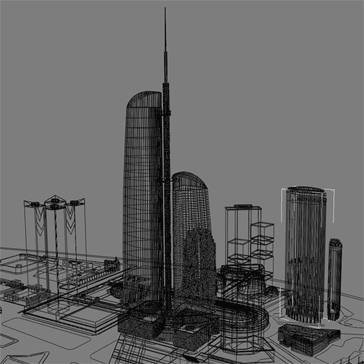ABOUT The New City
[Sydney, Australia]
In my view, the most important feature of postwar ... development has been the almost simultaneous decentralization of housing, industry, specialized services, and office jobs; the consequent breakaway of the urban periphery from a central city it no longer needs; and the creation of a decentralized environment that nevertheless possesses all the economic and technological dynamism we associate with the city. This phenomenon, as remarkable as it is unique, is not suburbanization but a new city.
Robert Fishman, Bourgeois Utopias: The Rise and Fall of Suburbia (1987)
The New City has attracted a variety of labels from the deepest
recesses of the blogosphere, so perhaps we should start by explaining
what we are not. We are not
‘Labor’s New Right fifth column online’. We are not ‘mercenary swine’. We are
not
‘right-wing nutcases’. We are not ‘paid for, and run by, the Liberal Party’. Our web
journal is not ‘astroturf’. Nor are we ‘intellectual servants of the
powerful’.
We believe that inner-city opinion makers have turned
their backs on ordinary working people: the 70 per cent of the workforce
who hold blue-collar and routine white-collar ‘jobs’, as distinct from
the 30 per cent who enjoy professional ‘careers’.
While one of us has worked for politicians, and both of us are
former local branch office-holders, we do not depend on any
political affiliation for our living, so we are free to speak
our minds. We have diverse private and public sector work histories:
currently one of us is a journalist and one a lawyer.
If politics really is about idealism rather
than self-interest, so-called "progressives" should be speaking out for the
interests, preferences and priorities of workers who are now spatially
concentrated in the growing middle to outer suburbs. But few of them understand or care about the new city.
Idealism means arguing against one’s own interests. And yet we have observed at close quarters that despite pretensions to the contrary, progressive inner-city activists, often mouthing fashionable green slogans, are all too short on true idealism while long on self-interest.
The effects are
adverse for broad-based economic growth, employment
dispersion, housing affordability, transport efficiency and a host of other urban challenges.
We are proud to have collaborated with our colleague Michael Thompson in
the writing of his ground-breaking book Labor without class:
the gentrification of the ALP (Pluto Press, 1999). While Michael was
subjected to a round of vilification from guardians of the progressive
party line, his warnings about the consequences of Labor’s wrong turn
were vindicated.
Like Michael, and unlike most progressives, we are more inspired
by the best days of Hawke than by the false promises of Whitlam. In
particular, we draw inspiration from one of the Hawke Government’s
greatest figures, Peter Walsh, whose rare integrity and intellectual
rigour earns him the title ‘Australia’s best ever finance minister’.
Peter’s uncompromising demands that government spending and taxing
policies produce real benefits for ordinary workers, rather than lurks
for the privileged, whether conservative or progressive, define Labor’s
‘light on the hill’.
Michael Thompson’s Labor without class and Peter Walsh’s
stringent principles join a distinguishable school of thought.
The New City aims to carry this school into Australia’s ongoing
urban and social debates.
Co-editors: John Muscat, Jeremy Gilling Post: PO Box 929, Rozelle NSW 2039 Telephone: 02 9810 2774 Email: thenewcity@live.com.au
|
Copyright © 2009, The New City. All rights reserved.
